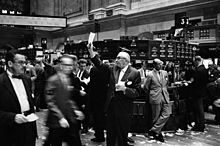A floor trader is a member of a stock or commodities exchange who trades on the floor of that exchange for his or her own account. The floor trader must abide by trading rules similar to those of the exchange specialists who trade on behalf of others. The term should not be confused with floor broker.

These traders are subject to a screening process before they can trade on the exchange. The people who operate as floor traders are in an open outcry system that has slowly been replaced by automated trading systems and computers that work in the same fashion as humans, without the interaction of people buying and selling stocks.
Process of becoming a floor trader
editMuch experience must be gained about the stock exchange as possible because it is an extremely fast-paced and competitive work environment. This is crucial to becoming a successful floor trader. Some may decide to work for a brokerage to get an idea of how the system functions or, as mentioned, to work as a clerk or trade-checker for another person. This is often necessary in order to save money for purchasing a membership which can be expensive, though memberships can be leased on a monthly basis, rather than purchased.
Every floor trader (FT) is required to file a completed online Form 8-R and have a fingerprint card. They must also have proof from a contract market that they have been granted the trading privileges to work on the trading field.[1]
Rise of machines
editThe first major electronic alternative was the Instinet, a machine that could bypass the trading floor and handle one another on a personal basis. The use of electronic mediums to conduct tasks done by floor traders has increased throughout the years, however there are many exchanges in the United States such as the NYSE that prefer to use the open outcry method that involves verbal communication.[citation needed]
See also
editReferences
edit- ^ "Floor Trader (FT)". National Futures Association. Retrieved 2 April 2014.